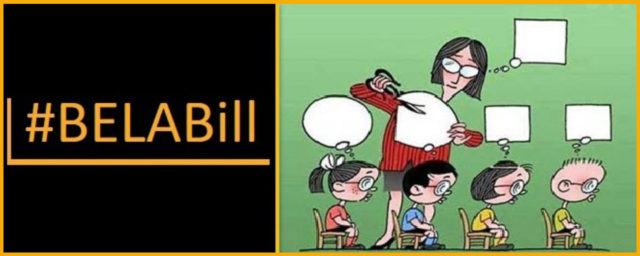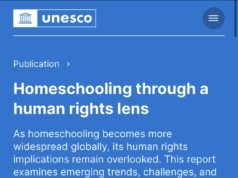
How the definition of home education in the BELA Bill will change the way in which we home educate
by Uda de Wet (Guest author: Home Education Alumni Association)
After months of deathly quiet, the BELA Bill is moving again. If you have forgotten what the BELA Bill is: The BELA Bill is the Basic Education Laws Amendment Bill, first published in 2017 for public comment, which aims to change the home education law in South Africa. The Department of Basic Education has reported their progress on the BELA Bill to the Portfolio Committee for Basic Education (PCBE), as previously reported to our members in a news nugget. That means the BELA Bill has started moving through the chain of official structures who need to sign off on it before it can be tabled at parliament. It will probably be brought before parliament within the next couple of months.
Over the course of the next two years (but maybe longer) there will be several opportunities for public engagement. An opportunity for public engagement entails that you and I – as individuals, as citizens, as parents, as members of organisations – get a chance to influence this piece of legislation. But in order to give any useful input we have to know how this law is going to influence our daily lives.
This is not an attempt to argue against the BELA Bill, or to compile a comprehensive list of problems, as such a list will probably have the length of a doctoral thesis. It is simply an attempt to share with you some (not even all) of the difficulties home educating families will likely run into once the BELA Bill has become law.
The BELA Bill definition of Home Education
The most recent version of the BELA Bill defines home education as follows:
“Home Education means a purposeful programme of education for a learner, alternative to school attendance, which –
- is provided under the direction of the learner’s parent, primarily in the environment of the learner’s home;
- may include tutorial or other educational support, if necessary, secured by the parent in specific areas of the curriculum followed by the learner; and
- meets the requirements for home education contemplated in section 51 of this Act.”
We are going to look at only two aspects of this definition which is worrisome and will have an impact on our daily lives as home educating families. These two aspects are the place where home education may be conducted and who may provide home education.
Let us now look at the first part of the definition, namely, where home education can take place under the BELA Bill.
The place of home education
Point (a) of the definition as quoted above states the following: home education should be provided “… primarily in the environment of the learner’s home …”
The word “home” most likely means the premises where the child normally resides – although this is not defined in the Act – Problem No. 1.
The word “primarily” means that not all education needs to be done at home. You will be able to go on outings, visit libraries, and have a couple of extra tutor sessions or other extramural activities. As long as you don’t go out too much. But does this mean at least 51% of the time? What if you child was at home 35% of the time, participated in a co-op 25% of time, spent 20% of the time on outings and practical work outside the home and 20% receiving specialised tuition at a tutor centre. Is that “primarily”? Problem No. 2.
Being able to educate at home is perhaps the ideal situation, and I really wish all home educators could have the freedom and luxury to educate physically at home.
But, as a fellow parent at the Liberty in Learning Coalition pointed out, what about the poorest of families who live in very small houses, or even shacks? Their homes may not be the ideal place to spend the majority of the time, but that certainly need not mean they are unable to educate their children themselves. Parents who live in poverty surely may still be highly capable and willing to facilitate their children’s learning. It seems very unfair that the BELA Bill, instead of helping these families, makes it difficult for them, by not allowing the parents to make use of the library or some other venue to educate their children themselves.
Another category of family which will be adversely affected by the BELA Bill, are families where both parents work, but one of the parents is able to take the children with them to their place of work. Say the mom is a hairdresser with her own studio. She is able to set up a separate room for her kids at her studio where they can continue with an online curriculum or other work throughout the morning. Because she works for herself, she can schedule her clients in such a manner that she has half an hour every hour or so to check on the children and help them with whatever they’re struggling with. This setup will be perfectly legal if the studio is at home, but just because they have to go to a different venue, the BELA Bill prevents these parents from educating their own children.
Still another category of family which will be adversely affected, are the families who travel frequently, whether nationally or internationally. What if the family actually spend most of the time on the road, or in guesthouses?
These problems may well be mitigated if the word “home” is interpreted to mean the family environment, instead of the physical building usually called “home”. This is, however, not the obvious meaning of the word, especially in the context of the rest of the BELA Bill.
Clearly this part of the BELA Bill’s definition of home education will most probably prove to be highly restrictive for a large number of home educating parents. The next part of the definition, which limits the persons who may facilitate the education, will add additional restrictions.
Who may provide home education
Point (b) of the definition reads as follows: “[home education] may include tutorial or other educational support, if necessary, secured by the parent in specific areas of the curriculum followed by the learner…”
Until now, any education at a child’s home was regarded as home education, regardless of who was doing the actual teaching. But under the new BELA Bill, tutors and other educational support may only be used for specific areas of the curriculum. With this clause, the BELA Bill therefore prohibits any full-time tutoring.
This prohibition will prove devastating for many families, especially during COVID and in a post-COVID world. There are many families in which both parents have to work for one or another reason, but who also are unable or unwilling to send their children to school. These families will no longer be allowed to obtain the services of an au pair or tutor to teach their children full-time at home.
And it is not only full-time tutors and au pairs that will be prohibited. Immediate and extended family members, such as older siblings, aunts, uncles, and grandparents, may also not be allowed to step in and teach a particular family’s children at home.
Online schooling or tutoring is another resource which might possibly be deemed out of bounds under the new law. Unless changes are made, they may no longer be able to provide a full package – the law may limit parents to only using their services for specific subjects.
To prohibit these solutions seem so ridiculous, especially with COVID in view, that one can hardly believe the government is seriously proposing this change. However, there are compelling reasons to believe this is indeed what they have in mind.
Firstly, the Policy on Home Education prohibits the use of a full-time tutor in Section 18.4 (2)(b): “A tutor … may not attempt to play the role of a school under the pretext of providing a tutoring service to the learner, e.g. taking over the full responsibility for delivery of the curriculum at the learner’s home or at another place away from the home education site.”
Secondly, DBE officials are known for declining registration applications where a full-time tutor is providing the education.
So even though the current law does not, in fact, prohibit the use of full-time tutor, the DBE seems to have cast a vote against it.
In light of the above it is difficult not to read this part of the BELA Bill definition as a prohibition of the use of a full-time tutor.
Conclusion
The definition of home education in the BELA Bill will severely restrict our choices on where we can home educate, and which resources we can use with regards to tutoring. It is deeply concerning that these proposed changes will have the effect of making home education inaccessible to the poorer families. Whereas home education is now an extremely affordable, versatile way of providing a high quality education for everyone, these changes may well restrict home education to the rich.
What we can do (right now)
Start thinking through the impact the BELA Bill will have on your family and community. Write it down. You will need this to prepare for any future engagement on the BELA Bill.
There will be some opportunities for public engagement both before and during the parliamentary process. The Pestalozzi Trust will keep its members informed of any such opportunities, and will provide guidance to its members on the kind of engagement which is necessary. If you are not a member yet, please consider joining up in preparation for the future battles. We need all hands on deck for this one!





